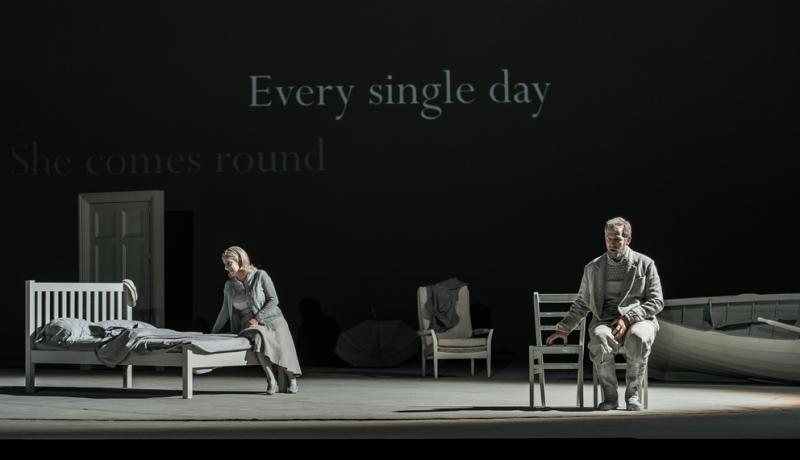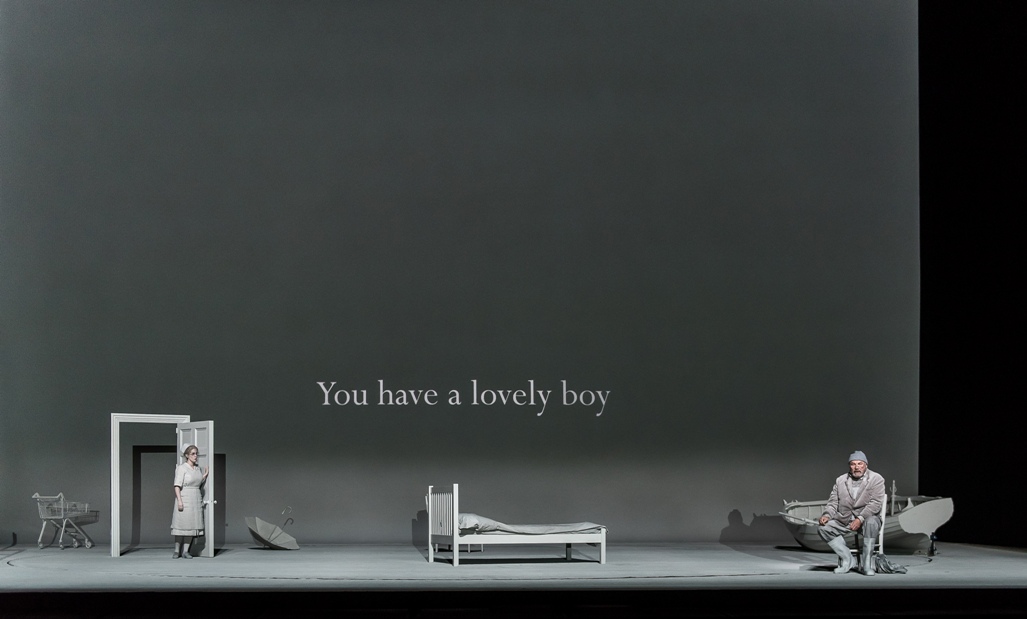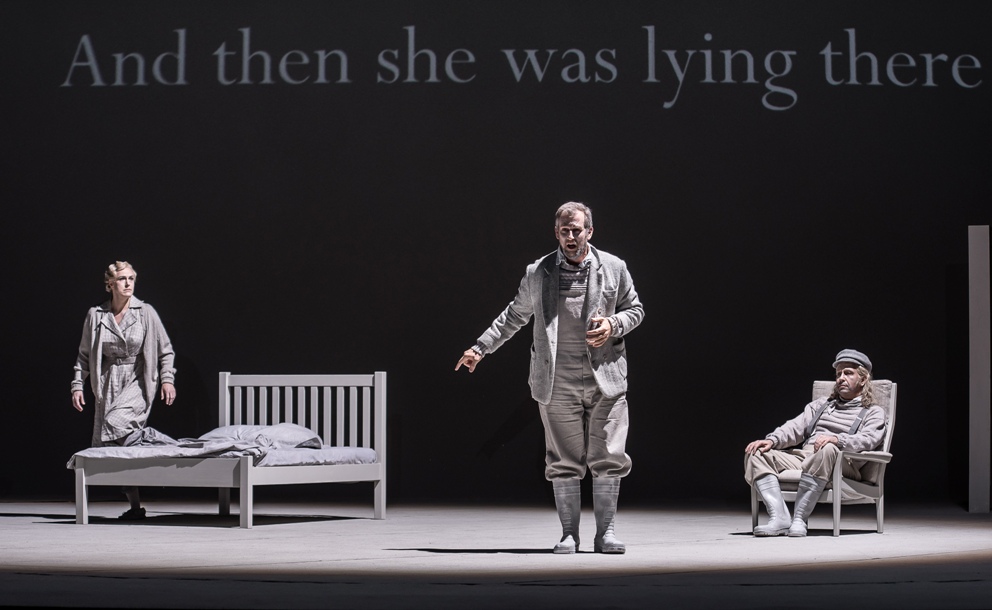Morgen und Abend, Royal Opera | reviews, news & interviews
Morgen und Abend, Royal Opera
Morgen und Abend, Royal Opera
World premiere of a spellbinding, unified meditation on birth and death

It’s never funny like Ligeti’s Le grand macabre, though it touches on that joke apocalypse’s more nebulous soundscapes. Nor is it obviously dynamic like David Sawer’s From Morning to Midnight, with which its title is not to be confused (there are no transitional stages here, only birth and death). Wagner’s cosmic sweeps don't entangle the banal with the numinous like this. So what exactly is the new opera Morning and Evening?
Of only one thing I’m sure: Austrian composer Georg Friedrich Haas and Norwegian writer Jon Fosse have created a world, before and after life as we know it, like no other. In this they’re near-perfectly assisted by the cast, and perfectly so by conductor Michael Boder and director Graham Vick, in a world premiere of which the Royal Opera and its Director of Opera Kasper Holten can be proud.
There’s none of the tawdry compromise that took the edge off busier firsts at Covent Garden like Ades’s The Tempest and Maw's Sophie's Choice; the hallucinatory experience is closer to Birtwistle's operas. Purity of intent – no spoiler here – is represented by the single line opposite the cast list in the programme, “Morgen und Abend…is the struggle of Johannes into and out of life”, and by the few chairs, bed, fishing boat, door, umbrella and trolley on Richard Hudson’s grey set.

No need here for the monumental complications that took the edge off the essential colour black of Calixto Bieito’s fierce Verdi over at ENO. These tones move from grey to magnesium-flare white, above all thanks to a huge lamp-light which rises and sets and oscillates like an unruly sun across and above the stage (anyone who’s seen Vick’s superb staging of Rossini’s Guillaume Tell at Pesaro, the production which should have come to Covent Garden, will have admired Giuseppe Di Iorio’s similar lighting there).
Bass drums thunder a birth from the boxes either side of the stage; disturbing, tritone-based chords from the orchestra and offstage chorus - superb - ease into clear triads, always luminous under Boder’s baton, single instruments making their mark with single notes. That great actor Klaus Maria Brandauer is just a little stagy in his declamation of English text and primal howls as old Olai trying to find out about the birth of son Johannes (Brandauer pictured above with Sarah Wegener as the Midwife). The words are often inaudible, and that's no fault of the orchestra, despite its density, ever being too loud. He says “I can’t hear anything” so often that if you don’t immediately get the point – I didn’t – you wish this was a Beckett-like monologue declaimed by John Hurt or Ian McKellen against a background of silence.
That’s to reckon without Olai’s disappearance not long into the constantly shifting score. The child is now a fisherman on the last day of his life, or maybe unknowingly already dead. Baritone Christoph Pohl takes over, singing a German text, and he’s compelling as Johannes: still but perplexed, sensing the ghost voices of his dead wife Erna (contralto Helena Rasker) and best friend Peter (tenor Will Hartmann, just occasionally strained; all three pictured below). These are the first developed songlines we’ve had since the beginning of a score that has been all sustained chords with weird bends between notes; occasionally the instruments join the singers in some surprisingly Straussian modulations. Haas’s figures on the grey canvas are never static, metamorphosing in far more interesting ways than a minimalist score; gradually we notice that the objects and the lamp-light are rotating too.

The music becomes almost human for duets in which Fosse harps on ordinary phrases about life, like Johannes’s pride that he and Peter have always cut each other's hair, or his daughter Signe (also played by Wegener) singing how she likes to stop by her father’s house daily and “have a little chat with you”. But Signe is the one person on this side whom Johannes must leave behind. Light, voices and music in extreme registers take us into the deepest, which is also the lightest, part of the opera. What happens to the English translation projected on the back wall by 59 Productions is equally haunting.
This, it’s clear, is what Haas and Fosse imagine it might be like to die. Attractive as the "all is one" philosophy may be, we may beg to differ when it comes to what if anything lies beyond, but the great thing about music drama, even one as arcane as this, is that it makes you believe for the duration. Haunting rather than moving, the whole immersion is something you have to experience. The BBC Radio 3 broadcast on 5 December should find this meta-opera at home in a different way; don't miss it in either form.
Add comment
The future of Arts Journalism
You can stop theartsdesk.com closing!
We urgently need financing to survive. Our fundraising drive has thus far raised £49,000 but we need to reach £100,000 or we will be forced to close. Please contribute here: https://gofund.me/c3f6033d
And if you can forward this information to anyone who might assist, we’d be grateful.

Subscribe to theartsdesk.com
Thank you for continuing to read our work on theartsdesk.com. For unlimited access to every article in its entirety, including our archive of more than 15,000 pieces, we're asking for £5 per month or £40 per year. We feel it's a very good deal, and hope you do too.
To take a subscription now simply click here.
And if you're looking for that extra gift for a friend or family member, why not treat them to a theartsdesk.com gift subscription?
more Opera
 Carmen, English National Opera review - not quite dangerous
Hopes for Niamh O’Sullivan only partly fulfilled, though much good singing throughout
Carmen, English National Opera review - not quite dangerous
Hopes for Niamh O’Sullivan only partly fulfilled, though much good singing throughout
 Giustino, Linbury Theatre review - a stylish account of a slight opera
Gods, mortals and monsters do battle in Handel's charming drama
Giustino, Linbury Theatre review - a stylish account of a slight opera
Gods, mortals and monsters do battle in Handel's charming drama
 Susanna, Opera North review - hybrid staging of a Handel oratorio
Dance and signing complement outstanding singing in a story of virtue rewarded
Susanna, Opera North review - hybrid staging of a Handel oratorio
Dance and signing complement outstanding singing in a story of virtue rewarded
 Ariodante, Opéra Garnier, Paris review - a blast of Baroque beauty
A near-perfect night at the opera
Ariodante, Opéra Garnier, Paris review - a blast of Baroque beauty
A near-perfect night at the opera
 Cinderella/La Cenerentola, English National Opera review - the truth behind the tinsel
Appealing performances cut through hyperactive stagecraft
Cinderella/La Cenerentola, English National Opera review - the truth behind the tinsel
Appealing performances cut through hyperactive stagecraft
 Tosca, Royal Opera review - Ailyn Pérez steps in as the most vivid of divas
Jakub Hrůša’s multicoloured Puccini last night found a soprano to match
Tosca, Royal Opera review - Ailyn Pérez steps in as the most vivid of divas
Jakub Hrůša’s multicoloured Puccini last night found a soprano to match
 Tosca, Welsh National Opera review - a great company reduced to brilliance
The old warhorse made special by the basics
Tosca, Welsh National Opera review - a great company reduced to brilliance
The old warhorse made special by the basics
 BBC Proms: The Marriage of Figaro, Glyndebourne Festival review - merriment and menace
Strong Proms transfer for a robust and affecting show
BBC Proms: The Marriage of Figaro, Glyndebourne Festival review - merriment and menace
Strong Proms transfer for a robust and affecting show
 BBC Proms: Suor Angelica, LSO, Pappano review - earthly passion, heavenly grief
A Sister to remember blesses Puccini's convent tragedy
BBC Proms: Suor Angelica, LSO, Pappano review - earthly passion, heavenly grief
A Sister to remember blesses Puccini's convent tragedy
 Orpheus and Eurydice, Opera Queensland/SCO, Edinburgh International Festival 2025 review - dazzling, but distracting
Eye-popping acrobatics don’t always assist in Gluck’s quest for operatic truth
Orpheus and Eurydice, Opera Queensland/SCO, Edinburgh International Festival 2025 review - dazzling, but distracting
Eye-popping acrobatics don’t always assist in Gluck’s quest for operatic truth
 MARS, Irish National Opera review - silly space oddity with fun stretches
Cast, orchestra and production give Jennifer Walshe’s bold collage their all
MARS, Irish National Opera review - silly space oddity with fun stretches
Cast, orchestra and production give Jennifer Walshe’s bold collage their all
 Káťa Kabanová, Glyndebourne review - emotional concentration in a salle modulable
Janáček superbly done through or in spite of the symbolism
Káťa Kabanová, Glyndebourne review - emotional concentration in a salle modulable
Janáček superbly done through or in spite of the symbolism

Comments
Monumentally boring. Nothing
Completely agree! I might've
Spellbinding, we loved this.